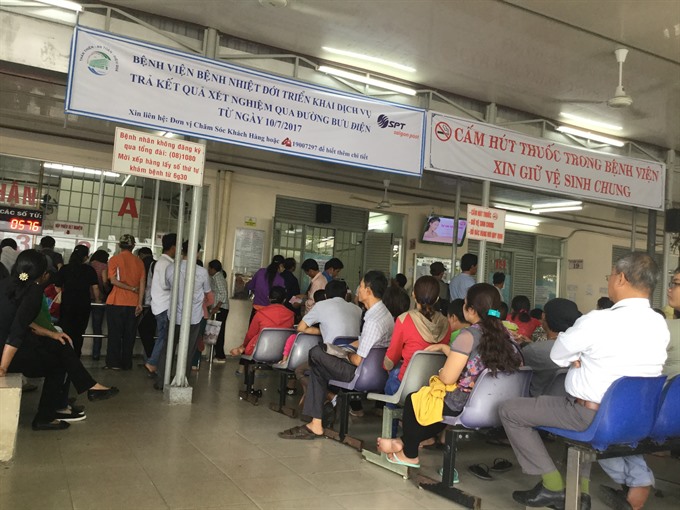 Society
Society

" />Twenty per cent of HCM City’s population with no health insurance have been hit with a 30 per cent increase in fees.
 |
| Patients visit HCM City Hospital for Tropical Diseases for disease treatment. —VNS Photo Gia Lộc |
HCM CITY — Twenty per cent of HCM City’s population with no health insurance have been hit with a 30 per cent increase in fees.
The fees took effect on Sunday at the group of public hospitals and health centres that were last on the list of places to see higher fees, as approved by the city People’s Council.
The first fee increase took effect on August 1 and was applied at 12 public hospitals with financial autonomy.
The fees for health examinations, for instance, rose to VNĐ29,000-VNĐ39,000 (US$1.3-$1.7) from VNĐ7,000-VNĐ20,000. Fees for beds increased from VNĐ57,000 to VNĐ157,000 per bed for one day.
The city’s Department of Health said the increase would help public hospitals ensure their regular expenditures.
On Sunday the city stopped funding public hospitals except for Nhân Ái Hospital’s two facilities which provide treatment for people in the final stage of AIDS, and for Bến Sắn Hospital for patients with leprosy.
Thạch Thị Liên, aged 42, from the Mekong Delta province of Trà Vinh who works in the city as a housemaid, told Việt Nam News Agency that she visited Trưng Vương Hospital in District 10 to treat sinusitis.
She does not have health insurance, so she had to pay more than VNĐ1.9 million due to the increased fees.
She said that she was unaware of the fee increase. “If I had known the fee would have increased, I would have bought health insurance,” she added.
At District 9 Hospital, Đặng Thanh Đào said that she was worried about her mother’s treatment because her mother did not have health insurance.
The mother was at the hospital’s emergency aid department, but was not expected to need treatment for a long period.
At the city’s Oncology Hospital, nearly 52 per cent of patients who visit the hospital for health examinations and treatment have health insurance.
A report from the city-based Việt Nam Social Security showed that 80 per cent of HCM City’s population is covered by health insurance.
A 23-year-old man with HIV from the city’s Củ Chi District said that he could not afford to buy health insurance.
“My family includes my mother and me. My mother trades in waste plastic, metal and paper for recycling, so her income is for daily needs only. I don’t have a job because I’m unhealthy due to HIV,” the man told Việt Nam News.
Nguyễn Thị Tú Anh of Hậu Giang Province, a vendor on Thoại Ngọc Hầu Street in Tân Phú District, said that she did not think health insurance was necessary. She seldom visits hospitals for treatment.
“Whenever I feel sick, such as coughing and sneezing, I go to drugstores to buy medicine,” she said.
Lưu Thị Thanh Huyền, deputy head of the city-based Việt Nam Social Security, said that hospital fees were expected to continue to increase, so even those with high incomes would incur higher costs.
Hospitals use the fee increases to pay salaries for healthcare staff, training and scientific research as the state budget does not allocate funds for these purposes.
People from other provinces and cities who move to live in the city apply for temporary residence status so they can buy health insurance, which can be used at hospitals.
The city aims to have more than 90 per cent of its population covered by health insurance by 2020. —VNS




